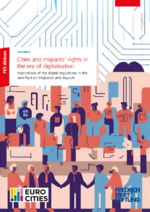FES diskurs | Cities and migrants‘ rights in the era of digitalisation
Implications of the digital regulations in the New Pact on Migration and Asylum
The EU New Pact on Migration and Asylum was passed in April 2024, one of the most significant initiatives announced by Commission President Ursula von Der Leyen during her tenure. Reaching an agreement on the New Pact proved difficult and contentious. The Pact includes ten different legislative packages, several of which concern migration management and asylum procedures at the EU’s outer border, including a pre-screening procedure and reform of the Eurodac biometric database. These policy changes must be understood in a larger context of more restrictive migration and border management policies and their nexus with digital policies and the use of digital technologies.
Léa Lebon’s paper looks at two of the ten legislative packages in more detail and aims to discuss the impact of the pre-screening procedure and the Eurodac reform on migrants’ digital rights, as well as the implications for the authorities in charge of integration policies at the local level, as cities have a role to play in protecting migrants’ digital rights.
Main findings
- The paper argues that the New Pact on Migration and Asylum harbours a significant risk of strengthening disproportionate surveillance, discriminatory procedures based on technology, and violations of data protection.
- The use of digital surveillance mechanisms and potentially biased technologies for migration policies can create serious risks to individual fundamental freedoms and access to essential public services.
- Yet digital tools such as databases and accessible digital services, when used within a strict framework, can also ease the inclusion of migrants and refugees in the host country.
- Analysing these impacts with a local perspective in mind can help administrations to develop initiatives to manage the arrival of migrants.
This timely paper provides reflections on how the combination of more restrictive legislation and the digitalisation of policy instruments can further push vulnerable communities into isolation or create new forms of poverty in cities, but it also offers recommendations to cities and local authorities on the role they can play in protecting migrants’ digital rights.
Download
Lebon, Léa
Cities and migrants' rights in the era of digitalisation
Berlin, 2024
Download (PDF) (615 KB, PDF-File)
About

Léa Lebon is a political scientist with a master’s degree in international–local relations and international cooperation. During their studies, Léa Lebon produced two master’s theses related to (I) multi-level governance in the European Union and the regionalisation of EU policies, and (II) the European Union and digital inclusion challenges at the local level.
Over their career, Léa has occupied positions in local and international NGOs focusing on digital inclusion and European affairs. For the past year, this has entailed working in Eurocities’ Digital Forum, where Léa has promoted human rights and social inclusion in the digital era, including through the transnational initiative ‘Cities Coalition for Digital Rights’. Léa is now working for Bordeaux Metropole as a consultant to support the Cities Coalition for Digital Rights (which is led by Bourdeaux Metropole with 11 other cities) in its advocacy of digital human rights at local, European and world levels.



